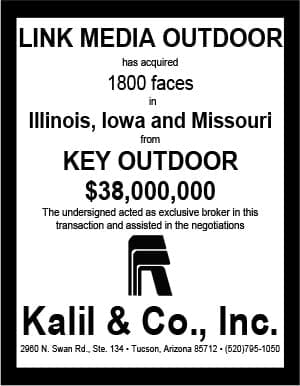
We want to live forever, but we don’t. Some out of home execs who have died recently include Thomas Young, Mitchell Matson, Gene Wingate, Barry Cramer, and Don Davidson. What happens to your out of home company when you die? Here are seven ways to death proof your out of home company.
Educate your spouse.
Put together a notebook with key info on your company’s bank accounts and investments, insurance, partnership agreements, buyout agreements and any other material agreements. Include passwords, user ids, safe deposit box keys and email and phone numbers for your business contacts. Go thru the notebook with your spouse and put a copy in your safe deposit box or in a safe at your house.
Multiple-signer or pay-on-death bank accounts
You should have multiple signers on your company bank accounts and individual bank accounts. The next best thing is a a bank account with a payable on death clause or a transferable on death clause. If there is a sole signer on a bank account and the bank is notified that the person is dead they will put a freeze on the account and bounce any checks or electronic payments which are submitted against the account until they decide what to do which could take weeks or months. They may ask you to open probate and get a letter from the court before they release funds. What if this happens to your out of home company bank account and vendor checks and landlord payments start bouncing?
A will
A will specifies where your assets go on your death and on your spouses death. Having a will avoids the chance that your heirs will fight over the disposition of assets. It also minimizes the cost and delay of probate. Probate is the legal set of rules each state has for the disposition of a person’s assets. If you don’t have a will someone will need to open probate and the court may appoint a trustee (think someone know knows nothing about the out of home business) to run your affairs and dispose of your out of home company. One out of home broker told Billboard Insider that getting an estate out of probate is a nightmare.
An estate tax plan
The federal estate tax is 40% of the value of your assets above $12.92 million. 17 states have an estate or inheritance tax on top of this. Billboard Insider’s state of Washington for example applies a 10-20% estate tax on assets in excess of $2.2 million! You can mitigate estate taxes by putting your assets in an A/B trust. See a good tax attorney.
Key Executive Insurance
If your out of home company has borrowed money you should take out key exec insurance in the amount of the debt. That way if something happens to you your out of home company goes to your estate free and clear of any debt. You don’t want a nervous bank pressing your widow for repayment. Contact Chris Bassler at Bassler and Company or Brian Cone at Cone Company if you need a key executive life insurance quote. In 30 years of lending, Billboard Loans has twice had a loan paid off by key executive life insurance.
A partner buyout agreement.
If you have partners, put together a buyout agreement in says what happens if a partner dies or is incapacitated. Use a buyout cashflow multiple that everyone agrees to or identify an appraiser like SignValue or Stark Capital to value the assets in the event of someone’s death. You can use key executive insurance to pay some or all of the partner buyout or you can agree to a series of payments.
A letter of instruction.
A letter of instruction should give power of attorney to someone you trust (e.g. another out of home exec, an employee, an out of home broker) to run your out of home company, pay bills and manage affairs through an orderly course of business sale. The letter should include the compensation you are willing to pay. It’s not fair to expect someone to commit a lot of time to managing company affairs for free. The letter of instruction can also name the broker that you’d like to handle a sale of your company. Keep whoever is going to run or sell the company informed so they are can step in if something happens to you.
This column is based on remarks Billboard Insider’s Dave Westburg made at the October IBO and OAAG conferences. If you want a copy of Dave’s presentation email davewestburg@billboardinsider.com
To receive a free morning newsletter with each day’s Billboard insider articles email info@billboardinsider.com with the word “Subscribe” in the title. Our newsletter is free and we don’t sell our subscriber list.
Paid Advertisement


















This is an excellent summary. One comment. With minor exceptions, a will must be probated. Property held in a trust can be transferred without probate proceedings.
Be careful in selecting your successor trustee. They will have complete control of the assets in the trust. As best you can, make sure your successor understands and will honor your wishes.